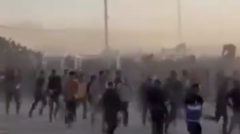The aftermath of a tragic attack in Kashmir has led to increased violence against Kashmiri individuals and vendors in other Indian cities. Many report harassment and threats while security measures have amplified fears among civilians in Kashmir, with calls for justice stirring more concern over collective punishment.
"Kashmiris Under Siege: Violence and Fear Post-Attack in India"

"Kashmiris Under Siege: Violence and Fear Post-Attack in India"
Following a deadly attack in Kashmir, community tensions escalate, as Kashmiri vendors face violence and discrimination across India, with ramifications affecting their safety and livelihoods.
In the heart of Mussoorie, a picturesque hill town in Uttarakhand, the vibrant presence of Kashmiri artisans—known for their exquisite pashmina shawls—has now become overshadowed by fear and violence. Shabir Ahmad Dar, a shawl seller from Indian-administered Kashmir, recalls the moment he, alongside another vendor, was assaulted by a mob from a right-wing group, incited by recent violence in Kashmir that left 26 people dead. Rather than being associated with the beauty of their creations, Dar and his companions found themselves facing the ugly brunt of prejudice, accused of culpability for the perpetrated attack.
The group stormed their market stall, unleashing a torrent of abuse while destroying goods worth thousands of dollars. "They told us to leave town and never return," Dar recounted, a somber reflection on the precariousness of his identity. With outrage brewing, police intervention was swift; however, the assailants were released after a mere fine and a forced apology—an outcome that left Kashmiri sellers feeling further threatened, prompting many to abandon their livelihoods in search of safety.
This incident is not isolated but rather a distressing pattern that has emerged since the Pahalgam assault. Kashmiri students and vendors report facing accusations and hostility, particularly in urban areas away from their homeland. Ummat Shabir, a nursing student, relayed a terrifying experience where she was labeled a "terrorist" and expelled from public transport simply for being Kashmiri, alongside stories of classmates enduring physical ejections.
Compounding these issues, security forces in Kashmir have instituted sweeping crackdowns, detaining thousands and demolishing homes believed to belong to suspected militants, actions criticized as forms of collective punishment. The sentiments echoed by local leaders emphasize the importance of distinguishing between culpable individuals and innocent civilians, as many Kashmiris grapple with the consequences of seeing their identities come under fire.
Shafi Subhan, a long-time shawl seller who previously found solace in Mussoorie, articulated a transformed reality; where once he felt welcomed, now he senses an ominous shift, marked by a disturbing lack of empathy from onlookers during their moment of need. The underlying historical complexities inflate present-day tensions, as Kashmir reflects the painful legacy of conflict stretching back decades.
The turmoil witnessed in Kashmir parallels the strained relationship that both India and Pakistan share over the territory, often putting its civilians in the crossfire. While some commend the supposed stability achieved post-2019, critics argue that this precariousness has come at the expense of civil liberties, reinforcing an atmosphere of distrust towards locals.
As protests to commemorate the recent victims unfold, the task remains to navigate this fraught landscape without perpetuating the cycle of hatred and violence that has long haunted Kashmir. Voices advocating for peace urge an understanding that Kashmiris, while deeply affected by violence, do not condone it and fundamentally seek normalcy in their lives.
In the wake of these events, the quest for an equitable resolution continues, highlighting the urgent need for compassion and consideration toward communities caught in the tumultuous throes of regional strife, where hopes of returning to a peaceful existence seem diminished but still persist.






















